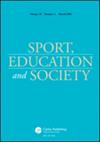人权在体育教育中的作用:对新课程的呼唤
IF 2.3
2区 教育学
Q1 EDUCATION & EDUCATIONAL RESEARCH
引用次数: 0
摘要
摘要体育在促进可持续发展和人权方面的作用已经确立。然而,关于体育专业人士对其贡献的理解以及他们是否准备好将其在该领域的影响最大化的证据是不足的。本研究旨在确定体育从业人员在体育运动中以及通过体育运动对人权原则的理解和应用情况,并探讨个人因素和背景因素在多大程度上影响采用基于人权的方法的倾向。151名体育相关从业人员(56%为男性,43%为女性,1%不愿说)的国际样本,年龄从18岁到65岁以上,包括教师、教练和学者,他们完成了为本研究设计的三份有效的体育和人权问卷(礼仪- q、礼仪- se和礼仪挑战)。调查问卷包括社会支配地位和人格的标准化测量(SDO-7量表和10项人格量表),以及一些探索体育与人权联系实例的开放式回答问题。结果显示,体育从业人员虽然承认体育对促进人权的影响,但在年龄、性别、受教育程度、人格特质和社会优势取向方面存在显著差异。鉴于反应的情境和性格差异,我们认为建立一个系统的方法将人权原则纳入体育相关专业人员的教育课程是很重要的。最后,我们呼吁在体育课程中纳入人权教育的三个关键要素:(a)关于基本人权的知识;(b)通过以体育为基础的干预措施中的人权进行学习;(c)加强体育部门的人权。关键词:体育运动;人权;社会支配地位;本文章由计算机程序翻译,如有差异,请以英文原文为准。
The role of human rights in sport education: a call towards a new curriculum
ABSTRACTThe role of sport as a contributor to sustainable development and human rights is well established. However, evidence on sports professionals’ understanding of its contribution and their readiness to maximize its impact in this field is insufficient. This study aimed to ascertain sports practitioners’ understanding and application of human rights principles in and through sport and to explore the extent to which individual and contextual factors can influence the inclination to adopt a human rights-based approach. An international sample of 151 sport-related practitioners (56% male, 43% female, and 1% preferred not to say), ranging from age 18 to over 65, including teachers, coaches, and academics, completed three validated questionnaires on sport and human rights designed for the study (RITES-Q, RITES-SE, and RITES challenges). The questionnaires included standardized measures of social dominance and personality (the SDO-7 scale and the 10-item personality inventory) and some open-response questions exploring instances of sports’ association with human rights. Results show that while sports practitioners acknowledge sport's impact on promoting human rights, there were significant differences based on age, gender, educational level, personality traits, and social dominance orientation. Given the situational and dispositional variation in responses, we argue that it is important to establish a systematic approach to include human rights principles in the education curricula of sports-related professionals. To conclude, we call for the inclusion of three key elements of human rights education in sport curriculums: (a) knowledge about fundamental human rights; (b) learning through human rights in sports-based interventions; and (c) empowering for human rights in the sport sector.KEYWORDS: Sportphysical educationhuman rightssocial dominancepersonalitycurriculumpolicy Disclosure statementNo potential conflict of interest was reported by the author(s).
求助全文
通过发布文献求助,成功后即可免费获取论文全文。
去求助
来源期刊

Sport Education and Society
社会科学-运动科学
CiteScore
6.50
自引率
20.70%
发文量
77
审稿时长
>12 weeks
期刊介绍:
Sport, Education and Society is an international journal which provides a focal point for the publication of social science research on pedagogy, policy and the body in society and the wide range of associated social, cultural, political and ethical issues in physical activity, sport and health.
The journal concentrates both on the forms, contents and contexts of physical education, sport and health education found in schools, colleges and other sites of formal education, as well as the pedagogies of play, calisthenics, gymnastics, sport and leisure found in familial contexts, sports clubs, the leisure industry, private fitness and health studios, dance schools and rehabilitation centres.
In addition to papers reporting original research, Sport, Education and Society will also consider various media (e.g., TV, film, web sites) as forms of pedagogy and report their impact on understandings of the body in society.
Sport, Education and Society encourages contributions not only from social scientists and educationalists studying the relationships between pedagogy, ‘the body’ and society, but from all professionals with interests in theoretical and empirical interests relating to policy, curriculum, social inclusion, equity and identity, and progressive educational development in physical activity, health and sport.
 求助内容:
求助内容: 应助结果提醒方式:
应助结果提醒方式:


